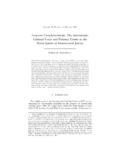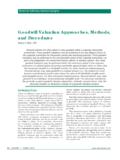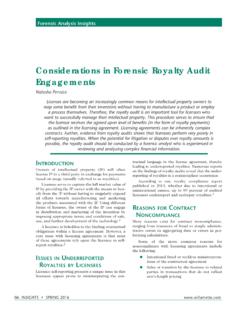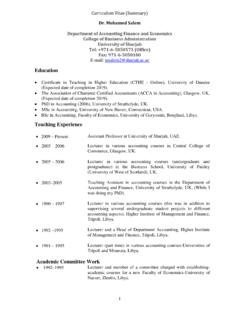Transcription of The “China, Inc.” Challenge to Global Trade Governance
1 \\jciprod01\productn\H\HLI\57-2\ : 1 1-NOV-169:02 Volume 57, Number 2, Spring 2016 The China, Inc. Challenge toGlobal Trade GovernanceMark Wu*In the past decade, the World Trade Organization has adjudicated over forty disputes between Chinaand other powerful economies. These cases are often trumpeted as a sign of the enduring strength of thetrade regime and the efficacy of international law in managing geopolitical tensions associated withChina s rise. This Article suggests that this positive assessment obfuscates dangers lurking on the explains why the rise of China presents a major Challenge to the multilateral Trade regime.
2 At the heartof this Challenge is the fact that China s economic structure is sui generis, having evolved in a mannerlargely unforeseen by those negotiating WTO treaty a result, the WTO can deal effectively with only a limited range of disputes those in whichChinese policies largely resemble elements of other alternative economic structures. Outside of this set ofissues, the WTO faces two very different but equally serious challenges . The first is reinterpreting certainlegal concepts to adapt and fit an unforeseen Chinese context. The second is deciding whether to expand thescope of its legal rules to accommodate issues that currently fall outside its jurisdiction.
3 This Articleexplores options for meeting these challenges . It suggests that the most likely outcome is one in whichChina s rise will exacerbate the diminishing centrality of WTO law for Global Trade World Trade Organization is widely heralded as a model for howinternational law can manage and mitigate tensions between states amid achanging geopolitical When it comes to the rise of China arguably,the most significant geopolitical Challenge of our times this might appearto be the case. A cursory glance gives rise to the following facts: in 1978, China accounted for less than 1%of Global By 2000, its share grew to 3% an impressive gain, but by* Assistant Professor of Law, Harvard Law School.
4 Many thanks to William Alford, Gabriella Blum,Che Pizhao, Ding Ding, Noah Feldman, Paul Gewirtz, Jack Goldsmith, Benjamin Liebman, LiuJingdong, Petros Mavroidis, Curtis Milhaupt, Mariana Prado, Intisar Rabb, Holger Spamann, AlanSykes, Chantal Thomas, Joel Trachtman, Yang Guohua, and David Zaring for their excellent insightsand suggestions on earlier drafts of this Article. This project benefited from comments and suggestionsprovided by participants at presentations given at Columbia Law School, the University of Toronto LawSchool, the American Society of International Law Mid-Year Research Forum, the Chinese Academy ofSocial Sciences Eleventh International Law Forum, Harvard Law School, and UC Berkeley School of Jia provided superb research assistance for which I am immensely John Ikenberry, The Rise of China and the Future of the West, 87 Foreign Aff.
5 , Jan. Feb. 2008, In 1978, China ranked thirty-second in the world in terms of its Trade volume. See Xiaojun Li,China as a Trading Superpower, inChina s Geoeconomic Strategy 25, 25 (Nicholas Kitchen ed.,2012).\\jciprod01\productn\H\HLI\57- 2\ : 2 1-NOV-169:02262 Harvard International Law journal / Vol. 57no means A decade later, its share had more than tripled,4 andChina became the world s top In 2013, China surpassed theUnited States to become the world s largest overall trading Depend-ing on how one counts, the Chinese economy now ranks as the largest orsecond-largest in the surprisingly, as China s importance in Global Trade has increased, sotoo has the number of WTO disputes concerning China.
6 Between 2006 and2015, forty-four cases representing over a quarter of the WTO scaseload have involved China as a complainant or a Only theUnited States and the European Union ( EU ) outrank China in officials give the impression that WTO dispute settlement iseffective. In the 2012 presidential election, President Barack Obamaboasted that his administration had filed more WTO cases against China inhis first term than his Republican predecessor had during the precedingeight Recent high-profile examples include the China Raw Materi-als11 and China Rare Earths12cases, in which the WTO ruled against Chi-nese export controls on inputs critical to high-tech has the WTO simply served as a forum for Western governments tovindicate their rights against China.
7 The reverse is increasingly true, but3. Valentina Romei, China and US Battle for Trade Leadership, Fin. Times (Jan. 10, 2014, 06:08 AM), World Trade Organization, World Trade Report 2011, at 31 (2011). John Miller & Marcus Walker, China Dethrones Germany as Top Goods Exporter, Wall St. J. ( , 2010), ; see also Steven Mufson, China SurpassesGermany as World s Top Exporter, Wash. Post (Jan. 11, 2010), Angela Monaghan, China Surpasses US as World s Largest Trading Nation, Guardian (Jan. 10, 2014), , , China Set to Overtake as Biggest Economy in PPP Measure, Bloomberg News (Apr. 30,2014), ; Crowning the Dragon, Economist (Apr.)
8 30, 2014), ; Hugo Duncan & David Martosko, America Usurped: ChinaBecomes World s Largest Economy Putting USA in Second Place for the First Time in 142 Years, Daily Mail(Oct. 8, 2014), Calculation based on information provided at Chronological List of Disputes Cases, World TradeOrganization: Trade Topics: Dispute Settlement, (last visited May 22, 2016) [hereinafter WTO Dispute List]. by Country/Territory, World Trade Organization: Trade Topics: Dispute Settle-ment: The Disputes, (last vis-ited May 22, 2016) [hereinafter WTO Disputes by Country/Territory]. Mark Landler, In Car Country, Obama Trumpets China Trade Case, Times (Sept.
9 18, 2012), Appellate Body Report, China Measures Related to the Exportation of Various Raw Materials, WT/DS394/AB/R, WT/DS395/AB/R, WT/DS398/AB/R (Jan. 30, 2012) [hereinafter China RawMaterials].12. Appellate Body Report, China Measures Related to the Exportation of Rare Earths, Tungsten, andMolybdenum, WT/DS431/AB/R, WT/DS432/AB/R, WT/DS433/AB/R (Aug. 7, 2014) [hereinafter China Rare Earths].\\jciprod01\productn\H\HLI\57-2\ : 3 1-NOV-169:022016 / The China, Inc. Challenge to Global Trade Governance263receives less attention in the Western media. In 2014, the WTO AppellateBody13 ruled for China in two different cases, finding that the Depart-ment of Commerce violated WTO commitments when imposing Trade rem-edies against several Chinese of this has fostered a perception that all is well with the WTO, atleast as far as dispute settlement is Optimists paint the grow-ing number of China-related cases in a positive light.
10 Emblematic of thisviewpoint is Professor Ka Zeng s suggestion that the growing utilization ofthe [WTO Dispute Settlement Mechanism] may have helped to channel thetensions surrounding the bilateral Trade relationship and prevented intenseinterest group pressure from impairing overall Trade relations. 16 This is undoubtedly true. But it obfuscates another growing academics and other commentators have missed (or at least, haveavoided mentioning) is that since the Great Recession, the pattern of WTOcases among the major trading powers the United States, the EuropeanUnion, Japan, and China has shifted dramatically.




